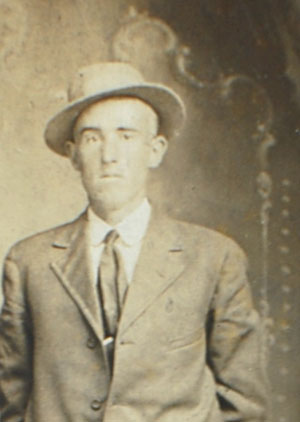

Remember...
Everett Otha Creasy
1890-1918
"No commander was ever privileged to lead a finer force; no commander ever derived greater inspiration from the performance of his troops."
John J. Pershing

|
Remember...Everett Otha Creasy
|
The Creasy family arrived in West Virginia, from Bedford, Virginia, living first in Malden in 1873, and moving on to Beaver in Nicholas County in 1874. Members of the Creasy family lived in a two-storey farm house close to Big Beaver Creek, between Calvin and Craigsville, West Virginia, in March of 1890, when Everett Otha Creasy was born. The Beaver community in Nicholas County is but a historical reference today, but then was a farming community. Everett Otha was the youngest of the family of Lewis Griffith Creasy and his wife, Mary Francis Leftwich Creasy. Otha joined a family of eight brothers and sisters, his parents, and an uncle who lived with them. The family had a quirky practice of naming the female children with masculine names, and included his sisters Henry Louzetta (married name: Fitzwater), Mary James (married name: Johnson), and Sara Roberta (married name: Robertson) in addition to brothers Joel Thomas, John William, Lewis Patrick, Hansel, and Daniel Obie. A baby sister, twin to Hansel, died at birth.
During the era of Otha's childhood and early manhood, many people engaged in more than one vocation in order to support themselves and their families. Otha didn't marry, and at the age of 27 still lived at home. The family operated their farm and a water-powered lumber and grist mill on Beaver Creek. They also tended a peach orchard, hunted, and fished. Otha was no different than many men of his era, working on the family farm but also employed in the outside community. Otha worked as a woodsman for the Birch Valley Lumber Company. His father and uncle also worked in timbering operations in the area. The mill, and the store associated with it, was a center of community social activity. The family had brought the knowledge of tobacco farming with it from Virginia, and they offered twisted strings of tobacco at the little store, made from the crop grown in Beaver.
War was no stranger to the Creasy family. Lewis, his father, 46 years old by the time of Otha's birth, was a Civil War veteran himself, with two of his brothers, John and Tom. All three were injured during the Civil War. Otha's uncle, John, was injured three times, recuperating from the last injury in a Union prison. Lewis is said to have fought at Bull Run and was at Appomattox to witness the surrender of General Robert E. Lee. The harshness of life in Virginia after the Civil War compelled the family to move, first to Malden and then to Beaver. The family was well acquainted with the how war affects soldiers and their families.
In the unpublished family history is included a statement from Hubert Hambrick, who served with Otha. Hambrick wrote:
Otha Everett Creasy, who was a comrade of mine in battlefields of France. He and I made a bargain that if either of us got back we would write a few lines in memory of the other one and it fell to my lot to write about him. Otha was true to the Red, White and Blue, to the all of his country and was a good soldier, honest and true to his comrades and was loved by all who knew him. I was with him from the time we went into training camp and can say that he always did his bit and did it well. He went into the St. Mahile [sic] front and was drawn into the Argonne Forest. I was with him on post duty several times when the night was so dark you could scarcely see your hand before you, but I felt safe for he was brave. After several days of fighting in the Argonne, Creasy said to me this is a hard life to live but there is a better place and the only way is to be ready for that place. On the morning of October 16, 1918 over the top we go. Creasy and his litter bearers, brave and cheerful. We always tried to lend a hand to the wounded. He was trying to rescue a wounded soldier under heavy shelling. The last I saw of him, about 7:30 the same morning he had won victory, his fighting days were over. A big shell fell between him and his partner who were carrying a wounded soldier, leaving evidence that he gave his life for his comrades and his country. It showed that he fought bravely until the last.His family and friends should be proud of his good work. He was a hero of the day. Fighting that we might have a home. Maybe those who were rescued by him remember his example and that he has made his mark in the world. While his body lies in Flanders Field in France, I truly believe his soul rests where the cry of war is heard no more, but joy and peace reign forever.
All photos courtesy Cynthia Mullens, who prepared this article referencing family histories written and compiled by William Creasy, Luella Creasy Mullens, and Lorena Creasy Zwilling.
August 2015

West Virginia Archives and History welcomes any additional information that can be provided about these veterans, including photographs, family names, letters and other relevant personal history.